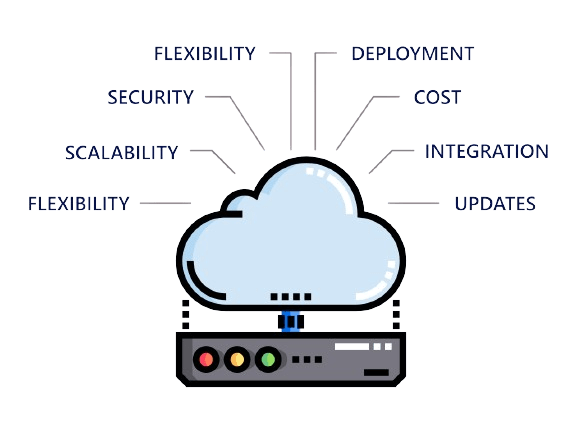Last Updated on July 8, 2024
You might have heard a lot of businesses talking about CRM. But, if the bulky software comes to your mind when you hear that. Then, you need to know that time has changed, and just like everything in today’s IT world, the traditional CRM systems have now been replaced by Cloud-based CRM, which offers flexible costs, easy maintenance, and numerous possibilities. It helps you build closer connections with your customers. Thus, you can grow your business further by targeting your unique business needs. We have come up with this blog, where we have discussed the benefits and other associated information related to Cloud CRM.
What Is A Cloud-Based CRM Software?
Before you proceed further, it’s important to have a basic idea about Cloud CRM software. It is a CRM software that is hosted in the cloud. Therefore, authorized users can access the required data from anywhere anytime via an internet-connected device. All your concerns regarding data storage, backup, security, and software up-gradation are taken-care by the hosting service provider. Apart from the advanced features, the Cloud-based CRM software offers all the features of on-premise CRM software as well. Hence, you can say that it’s an affordable choice that you make for your business productivity. Besides, it’s more accessible and much secure. And thus, it takes away all the major concerns that businesses today have.
How Is It Different From Other CRMs?
A CRM hosted on the cloud is different from traditional, on-premises CRMs in several ways:
- If you consider the traditional on-premises CRM systems, you may find that these are complex in architecture and usually end up taking a lot of time to install and implement. On the other hand, a CRM software hosted on the cloud can be set up instantly, allowing organizations to make the most of its advance features.
- Cloud CRMs host all the required services in the cloud versus on-premises CRMs, which are mostly hosted on your location and managed by your IT department.
- The Cloud CRM provider handles updates, maintenance, and storage of a CRM application. Whereas, the on-premises CRM is managed by an in-house IT department. Who is responsible for updates, customizations, system administration, and maintenance.
- Unlike traditional CRM, cloud CRM is easy to use. It offers instant access to critical information across the sales cycle.
- A cloud CRM is exceptionally affordable with minimal upfront costs when compared to a traditional CRM, where the initial capital investment can be higher.
- With traditional CRM, you can access your data only during office hours. However, you can access important information anytime by CRM software on the cloud. It helps organizations improve process efficiency.
- The traditional CRM systems are stand-alone systems and have inferior integration capabilities. While the other offers robust integration with multiple third-party products. Also, it allows the organizations to carry out various tasks seamlessly across various departments with much ease.
If you are struggling with issues like occasional internet dependency for access, potential downtime during server maintenance or outages, data security concerns despite robust measures, and limited control over server performance. You must know how QuickBooks Cloud Computing works.
What Are The Benefits Of Hosting CRM Software On The Cloud?
It wouldn’t be wrong to say that, Cloud-based CRM is much better when compared to on-premise software. Below we have mentioned the major benefits that Cloud CRM offers:

1. Easy to Use
When it comes to the providers of Cloud-based CRM software, they try their best to prioritize the user experience because they understand that it’s difficult for the agents to learn new systems at a faster pace. Whenever agents come across a new system, they somehow don’t use it to its fullest potential. That’s why the providers offer them click-and-drag features so that they can build personalized email templates. Along with that, they avail interactive dashboards and reports for agents so that its easier for them to analyze significant customer data.
2. Reliable operation
Nobody would ever want to have a system that crashes every now and then, and that further leaves you with a potential financial meltdown.
You will never come across such a scenario with Cloud CRM, as all your data is automatically backed up. Therefore, no matter if a natural disaster occurs your information would be secured on the remote server.
3. Mobility
With Cloud-based CRM, businesses have the full authority to access the software on their own, from anywhere at any hour of the day via an internet-connected device.
While, when you compare an on-premise CRM software, you can access it only from your workplace. Thus, it doesn’t allow the agents working from home to take out the data when required for an important meeting.
Mobility is required because when it comes to sales agents and managers, they spend most of their day outside the office. Thus, if you are in a meeting where your client asks you to show the latest reports that are related to the growth of the company, it won’t be a hassle for you anymore to show all the required data. And, you can crack an important sale by making a few efforts.
4. Anywhere/Anytime Access
Unlike traditional on-premises CRM systems, which you can access only during work-hours, around-the-clock accessibility is undeniably the utmost benefit that the providers of cloud CRM offers. By offering anywhere anytime access to the system on any device – a cloud CRM enables various clients to get the information they need, which in turn, improves the business efficiency. It has made multiple tasks more manageable, for instance, making urgent sales calls on-the-go, amending a sales proposal, quickly finding a prospect’s phone number, or sending an e-mail to the manager when out of the office, etc. It would be wrong to say that the best cloud CRMs for SMBs offer seamless round-the-clock access to the centralized database.
5. No Hardware or Software Necessary
All you need is a stable internet-connected and you can do all you want to. It’s the responsibility of your service provider to make sure that your software is running smoothly. Thus, you no longer need to make expenses on hiring an IT team that further assists you to set up and maintain a CRM system, or data servers to host the bundles of information. Now, all the customer data is stored in the cloud that is easy to access by any of your teammates. Besides, you will save a hefty amount by not investing on new equipment or software licenses.
6. Customizable to Business Needs
It’s great if you’re planning to invest in cloud-based CRM software. Depending on your budget and business needs, you can customize your plan and choose the best that fits the best to your business. For example, say your business has only 10 agents, then you don’t need to select a plan for thirty agents. You can also choose the features that you want to keep for your firm. For instance, some might think that call recording is a must-have while for others it won’t and they might see it just as an extra cost. Thus, when you are given the choice to choose what you need, it leads to positive results.
7. Easy Installation
The deep-rooted fear of most organizations is that they think CRM installation is a long and complicated process. But, it doesn’t hold true, and when it comes to a cloud CRM. You can set up a running modern cloud CRM in no time. All you would need is an internet connection. Once you have signed in online, you can start using the software instantly and make the most of its advanced features. Besides, you no longer need to make huge expenses on hardware set up, server, software maintenance, IT person onsite 24×7. Also, do not worry about complicated installations, data migrations, or even upgrades – your cloud-CRM service provider will take care of all these hassles.
8. Cost-Effective
If you talk about the traditional CRM systems, the most substantial investment was the upfront capital expenditures. Is it still required? NO, NOT ANYMORE! Like other cloud solutions, cloud-based CRMs also offers a pay-as-you-go subscription model. With minimal upfront investment, it reduces the chances of risk and enables smaller organizations to achieve economies of scale sooner. Since small businesses cannot invest a big chunk of money for an enterprise system, these smaller, regular installments will aid them in leveraging the many capabilities that are available while improving their bottom line.
9. Secure
At times, you might have heard that cloud solutions are not very secure. Contrary to that belief, for the companies that offer cloud-based CRM, security is their foremost priority. They have come up with advanced backup policies and robust data recovery plans, and thus, have taken security to an entirely new platform. Thinking, what’s more? You may improve your data safety and security by using two-step authentication and strong passwords. It is an essential criterion for being GDPR-compliant.
10. Flexible
Every organization has its own CRM needs. A cloud-based CRM offers a solution that you can alter as per your business needs. For instance, small businesses can begin by using the minimal CRM features that can help them do their current work with enhanced efficiency. Further, they can add more capacity, new features, and advanced modules as per their business growth. You can keep your CRM updated to satisfy the unique accounting needs. Besides, you also avail 24×7 access to the system. Similarly, it offers employees the flexibility and freedom to do whatever they need to do when they need to do it to serve their business with the best.
11. Simple Integration
If you talk about, traditional, stand-alone products, then, you may realize that it often can’t deliver the flexibility and integration that most of the clients demand. It is right in the case of a small business environment, where information exchange between available technologies is paramount. It’s easier for a user to integrate a cloud-based CRM with other applications and software, such as e-mail clients and productivity tools. It allows you to carry other tasks seamlessly so that you can achieve end-to-end visibility across the entire sales process.
Find A Cloud-Based CRM As Per Your Business Needs
Here, we have mentioned five major reasons to let you know your business needs Cloud-based CRM.
- You can have access to real-time insights into your sales opportunities.
- No doubt, it will help you to enhance your customer retention rates.
- It further assists you to automate your task management processes that include: following up on leads, closing sales deals on time, and ensuring better service
- It will help you centralize your customer database.
- If you want to have a comprehensive view of your interactions with customers, then it is a great help.
Can It Benefit Your Firm?
If you want to provide an excellent customer experience, then you must adopt Cloud solutions. A cloud-based CRM assists you to centralize your customer database and automate critical processes. That further provides you with access to real-time updates and a comprehensive view of your interactions with customers. However, you can avail many benefits if you host your CRM software on the cloud. Some services include easy-to-install, around-the-clock access to information, cost-effective and secure, flexible, and offer several integration options.
Therefore, you must choose an experienced cloud CRM service provider that assures flexible cloud solutions to fit your business needs. To avail the best CRM software for 2020, place a call on our helpline number of QuickBooks cloud hosting providers.

Oriana Zabell, a professional cloud engineer, has over three years of experience in desktop, online QuickBooks support and troubleshooting. She is currently working as a cloud hosting consultant with Asquare Cloud Hosting. She loves to read and write about the latest technologies such as cloud computing, AI, DaaS, small businesses, manufacturing. When not writing, she is either reading novels or is indulged in a debate with movie fanatics.